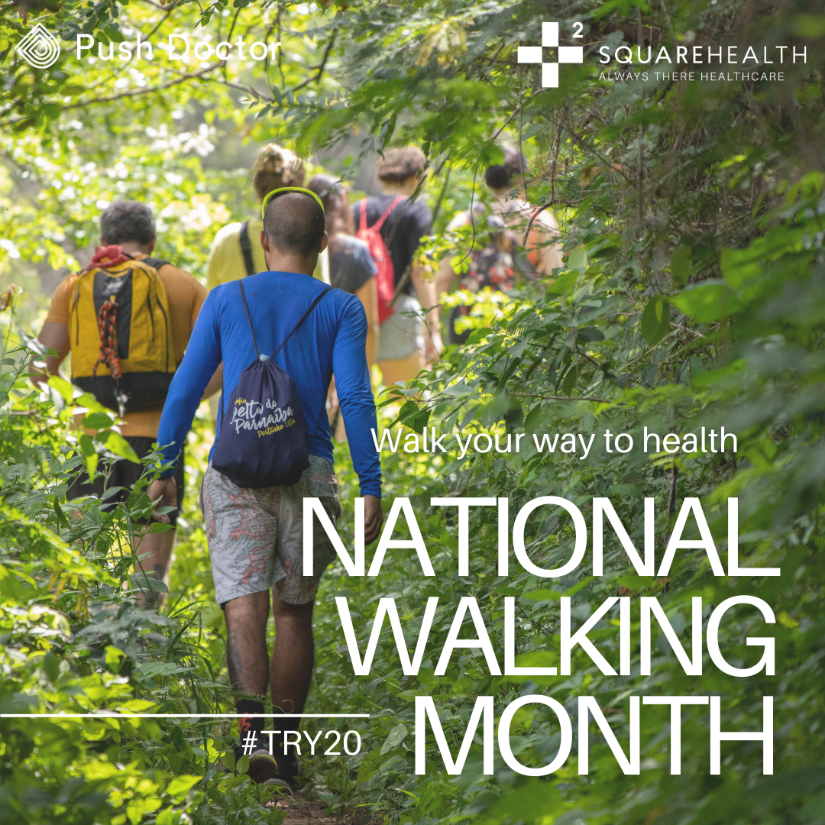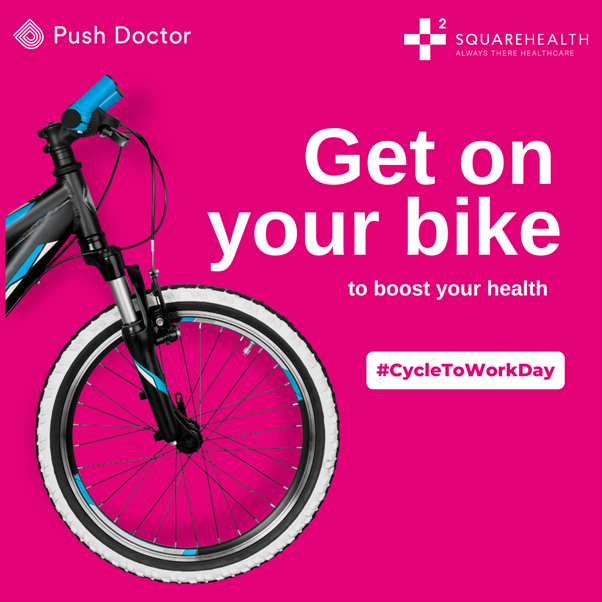By Push Doctor
Fitness challenges to improve your health

Fitness challenges to improve your health
Being physically active helps us manage our weight, reduces our risk of disease, strengthens our bones, and muscles, and improves our ability to perform daily tasks.
Physical activity can reduce your risk of major illnesses like coronary heart disease, stroke, Type 2 diabetes, and cancer by up to 30%, as well as your risk of dying prematurely. People who engage in regular physical activity also have a 30% lower risk of depression.
To mark National Fitness Day on September 20th, we spoke with Square Health personal trainer Tim Arnold about several fitness challenges for people of all levels to try and stay inspired and motivated.
Beginner level – your challenge is being more active
Your challenge will be to increase your steps by walking. It's low impact, requires little equipment, can be done at any time of day or in any weather (though sleet, rain, or snow aren't as pleasurable), can be done at your own leisure, and it's FREE!
What you need to do
- Look at your average step count from the last seven days
- Your target for the NEXT SEVEN DAYS is to increase your steps by 2,000 per day as an average (which is 14,000 steps for the week)
- Then the week after, your target will be to increase your steps to 4,000 per day (which is 28,000 steps for the week)
How long does it take to walk 2,000 steps?
Assuming an average stride length and a moderate walking pace, it is estimated that 1,000 steps will take around 10 minutes. However, this is only an estimate, and each person's results may differ. So, 2,000 steps moving with intent at a moderate pace will take you 15 – 20 minutes and 2,000 steps is equal to walking around one mile.
- Take the long route, for example around the supermarket to get to the aisle that you need
- Park further away when shopping
- Take the stairs instead of the lift
- If you’re on public transport, then get off two stops earlier
- Listen to a 30-minute podcast and walk for the duration of it
The health benefits of increasing your step count
Daily walking helps strengthen bones, lower excess body fat, improve cardiovascular fitness, and build muscle strength and endurance. Other benefits also include:
- Calms your mind - regular exercise can help you feel better, and it is especially beneficial if you have mild to moderate depression.
- Helps prevent heart disease and stroke.
- Controlling diabetes. Research studies have shown walking to be beneficial in lowering blood glucose levels and so improving diabetes control.
- Can help arthritis - a 30-minute daily walk can help reduce joint pain, stiffness, and inflammation. It can also aid in the prevention of osteoporosis and the reduction of bone loss.
- Helps you to maintain a healthy weight. Walking is very effective for toning your legs and buttocks as well, which is always a win, win situation.
- Reduces dementia risk - according to a new study, walking 4,000 steps each day may cut the incidence of dementia by 25%.
Measuring your steps on your phone to keep track of your progress
You can already use your phone's built-in step counter for free. Below are links to 'how to' guidelines for setting it up so you can measure your progress and set goals for yourself.
- How to count steps on iPhone and Apple Watch
- How to track steps on Android. Your Android phone can essentially be a "Google pedometer" with the Google Fit app and you need to download it from the Play store.
Intermediate level - your challenge is to increase the frequency and intensity of your exercise
You're already pretty active, which is great for your health, but let's shake things up a little and push you out of your comfort zone. Your fitness challenge is to introduce some specific exercises focusing on movement, some examples for you to think about and try out are:
- Running
- Swimming
- Weight training
- Other sports, such as football or netball
What you need to do:
Choose one or two movement exercises and gradually increase the frequency and intensity. In the case of swimming, for example, if you swim once a week, you will need to swim twice a week.
If you currently swim 30 lengths, consider swimming 75 lengths, which will take around an hour and burn over 1,000 calories, equal to running 10km.
Some of the health benefits of swimming
One of the most significant advantages of swimming is that it trains your entire body from head to toe, and swimming:
- Increases your heart rate without stressing your body
- Tones muscles
- Builds strength
- Builds endurance
Every week, try to increase the frequency and intensity of your chosen movement exercise. Have fun!
Advanced level - your challenge is to do something you wouldn’t normally do
Exercise is a part of your everyday life; but you may have become stuck in an exercise rut; it happens to us all. It's time to try something new, something that will train different muscle groups than you're used to and take you out of your comfort zone.
What you need to do:
Find something you've never done before, such as a race or a competition that you can aim for. There are numerous options available throughout the UK, ranging from 'Tough Mudder' events to 'Nightrider London', to mention a few.
If you are always weight- training then try some yoga or Pilates classes in person or online. Pilates enhances mobility, which can aid with lifting, as well as abdominal endurance, hamstring flexibility, and upper body muscular endurance.
If you’re very experienced with yoga or Pilates, then you can try weight or resistance training. Weight training, or any sort of resistance training, can provide numerous health benefits. What you might not know is that weight training can help alleviate many of the negative symptoms of menopause, such as hot flushes and weight gain. Don't worry, you won't look like Arnie from Terminator, but you will have stronger bone density and resistance training will help you lose excess body fat, so you will look better in your clothes.
The key to these challenges is to ensure that your workout is always diversified and that the relative levels of intensity of what you are attempting to perform are maintained. Have fun and push yourself to become a fitter, healthier version of yourself.
Tim Arnold | Square Health personal trainer

Tim has over 15 years of experience in the health and fitness sector, initially working for a large health club chain and now running his own fitness practice in West Sussex, which comprises a former CrossFit gym and a personal training studio.
Tim also has a thriving online coaching business where he focuses on his clients' health, fitness, nutrition, and overall well-being. He is also a member of the ‘Register of Exercise Professionals’ and the ‘Chartered Institute for the Management of Sport and Physical Activity.’

